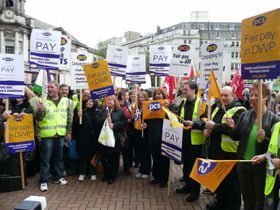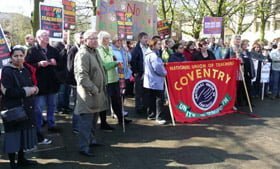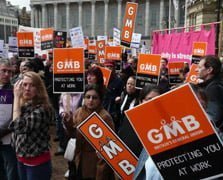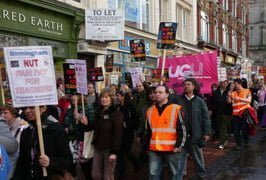Britain
has been hit by what trade unions have called the biggest wave of work
stoppages since the Labour government came to power 10 years ago, with up to
400,000 public sector employees going on strike.
(Reuters: Headline and opening
sentence Friday, 25 April 2008)
 On Thursday April 24th teachers, lecturers and
On Thursday April 24th teachers, lecturers and
public sector workers staged a one-day strike. Teachers were out on official strike
for the first time for 21 years. They were joined by Further Education (FE)
lecturers organised in UCU and public sector workers from the PCS union who are
faced with a government imposed 2% pay rise limit. At last workers in the
public sector were taking organised, coordinated and united strike action
against pay offers that represent a cut in their standard of living.
From the mass demonstrations the length and breadth of the
country the message was loud and clear – the abuse and exploitation of public
sector workers must cease and the government must change course or face the
consequences. With the local elections coming up soon the message has to be
heeded if Labour is not to end up being humiliated at the polls.
Media Coverage Bias
The contrast between two TV news broadcasts in reporting the
public sector strike could not have been greater. As socialists we do not
expect main stream TV to be favourably disposed to workers taking action, yet
the bias exhibited by the BBC confirmed yet again that it is the mouthpiece of
the state and the Labour government.
The BBC news broadcast at 6pm on April 24th interviewed
a mother wearing a nurse’s uniform. She accused public sector workers who were
out on strike as being selfish. Next came another young mother who complained
about having to stay at home to look after her children and losing £35 for a
day’s work. The question was not asked as to how someone could work a full week
and manage to live on £175! Then came the businessman, a cafe owner, who complained
that his usual customers, school children, were at home so his takings were
down. THE ONLY ATTEMPT TO EXPLAIN THE REASONS FOR THE STRIKE ACTION BY NUT
MEMBERS AMONG OTHERS WAS THAT THE OFFER TO TEACHERS WAS 2.45% WHEN THE RETAIL
PRICE INDEX (RPI) STANDS AT 4.1%! QED! Their standard of living was falling.
Even worse was the BBC’s deliberate distortion of the pay
scales that teachers are on. The news broadcaster George Allegiah claimed that
after 6 years teachers could earn between £30 and £34,000 per annum. The
reality is that at the moment a qualified teacher, with a degree and a teaching
qualification, will earn £20,133 in the first year. After 6 years this can rise
to £29,427. Only after 9 years are there possibilities of some teachers who go
on to the Upper Pay Spine point 3 earning £34,281. With the proposed salary
increase of 2.45% the salary in the first year will rise to £20,627 and in year
6 to £30,148. These scales apply to the overwhelming majority of teachers in
England and Wales. ONLY IN INNER LONDON WITH HIGHER HOUSING AND TRANSPORT COSTS
ARE THERE HIGHER RATES OF PAY. Here in the first year teachers can earn the
princely sum of £24,168 rising to £33,936 in year 6. The BBC’s comments on pay
levels were yet another attempt to discredit teachers in the eyes of the
public.
The BBC also claimed that other teaching unions opposed the
NUT action. The leadership of the NAS/UWT did a survey of members’ opinions,
not a ballot, and decided that their members did not want to take action. The
ATL union is a no-strike union and despite having some very good trade
unionists in its ranks, as here in Coventry, never takes industrial action
although some of their members in colleges have in the past contributed to
NATFHE strike hardship funds. The reality however is that despite the good
intentions of members of these trade unions, the campaign and sacrifices for
better pay in schools and college is falling disproportionately on NUT and UCU
members. Once a better pay increase has been achieved through our action, all
teachers and lecturers will benefit.
At least on Channel 4 at 7pm on the same day it was revealed
that for the last 3 years and for the next 3 years the pay of teachers would be
pegged to the Consumer Price Index (CPI) which does not include mortgage costs
or council tax. This stands at 2.1%. Parents were interviewed who were
sympathetic to the plight of teachers even if they weren’t in favour of the
strike. The problems of recruiting and retaining qualified teachers was also
highlighted as, relative to other graduate professions, the salary of teachers
is low. Some schools are being forced into recruiting unqualified staff because,
for the money on offer, qualified teachers will not come to the schools.
Yet despite all of these obstacles of media bias and
government/employer condemnations the general picture was that about a third of
all schools, with 2.6 million pupils, were affected in some way by the action
with many having to close for the day.
For UCU members in my sector of education, FE, and for all
other workers taking action, a sacrifice was being made in losing a day’s pay
by going on strike. So action is taken reluctantly as workers cannot lose money
when prices are galloping ahead. But patience has run out. Workers are at the
end of their tether.
The figures speak for themselves. RPI stands at 4.1%. Food
inflation is up 11.1% over the year with butter up 62%, eggs up 35% and bread
in the last 3 months alone up 25%. Energy costs in gas and electricity prices
are rising on almost a monthly basis and over the year have increased by over
30% at least. Since December 2007 alone petrol is up by 10% and the projections
are that a litre will cost £1.50 by the summer!
Further Education
At the same time FE lecturers have been offered a pay rise
of 2.55%. For the past 4 years pay rises have been below the level of
inflation. The average hourly pay of FE lecturers is 15.5% below the level of
our colleagues who teach in the secondary sector and yet under the 14 -19 year
old teaching programmes being expanded in FE we are teaching the same children
for far less money. The UCU claim for FE is 6% to make up for past increases
that were below the inflation rate and to make some inroads into the
differentials between ourselves and our colleagues who teach in schools.
 In addition there is job insecurity. Some 11,000 FE jobs
In addition there is job insecurity. Some 11,000 FE jobs
have been lost since 2004. 14% of FE lecturers are employed on a casual or
agency basis compared to 4.5% of comparable teachers who work in Sixth Form
Colleges. And yet FE teaching staff, who already teach nearly 4 million young
people and adults, are supposed to be at the heart of the government’s skills
strategy.
National negotiations too between the employers’ body, the Association
of Colleges (AoC), and the unions representing FE staff are a joke. National
agreements are essential to maintain national standards of pay and conditions,
to prevent fragmentation of the sector, to prevent pay differentials that
divide workers. But in what other area of the economy would you get national
agreements only being implemented if the individual colleges up and down the
country say they can afford to do so? In other words, unlike in schools,
nationally negotiated terms and conditions are not binding on local colleges.
In FE once the national agreement has been made it is then down to local
bargaining
You therefore get the situation where 4 years ago it was
agreed nationally that FE teaching staff would move to an 8-point pay scale
similar to that for teachers. Before this agreement it took 14 years for
mainstream lecturing staff to reach the top of their pay band. The new
agreement meant that it would now take 8 years instead. Yet there are still 47%
of colleges nationally who even after 4 years have still not implemented the
new pay scale.
Incorporation or
Privatisation
Here there is a warning for teachers in schools who may be
in the process of having trust status or some other form of “independence”
thrust upon them. FE colleges were “incorporated”, that is became private
corporations, in 1993. They were therefore taken out of Local Educational
Authority control and accountability, were run by unelected Boards of
Governors, and any land and building they were occupying at the time of
incorporation became their private property, to dispose of as they saw fit.
In Coventry, for example, we have a beautiful medieval
building, the Charterhouse, that used to house monks, and which was bequeathed
to the citizens of Coventry years ago. It is now the property of City College
Coventry. All the land and buildings that once belonged to the citizens of
Coventry, bought and paid for out of local rates and taxes, controlled and run
by a democratically elected city council that was accountable to the
electorate, are now owned and controlled by unelected college corporations –
and not a penny was paid for them!
What has been the effect of incorporation for teaching staff
in FE? Pay and conditions vary from college to college, holidays have been cut,
salaries have been held down and teaching hours have increased. It is little
wonder that 82% of teaching staff report increasing workloads and stress.
And while teaching staff have seen their standards of living
eroded, what has happened to the Principals of FE colleges? Since 2002 their
pay has risen on average by 22% to an average of £100,000 per annum. In the
past year alone their pay has gone up by an average of 4.5%!
FE Employer Reaction
to the Strike Vote
So lecturing staff balloted for industrial action – 65.5%
voted to strike and 86.2% voted for action short of a strike. When the result
was known and the date for action was set, FE lecturers at City College
Coventry were sent a letter by the Principal, Paul Taylor.
While the letter recognised the right of individuals to take
industrial action so long as all legal requirements had been followed, the
introduction to the letter states twice that under existing labour relations
legislation, strike action constitutes a breach of contract. The letter also
threatens staff with recovery of any damages that may be sustained as a result
of this breach of contract. It goes further – and this is a warning for workers
everywhere who believe that they can be effective in taking industrial action
short of a strike to try and avoid losing a day’s pay – in warning lecturers
that failure to perform any part of normal activity under their contract of
employment constitutes “partial performance”, which again is a breach of
contract. So any staff member working at the college but taking any action,
however minute, in support of their pay claim, and where such action is less
than they would normally do or does not fulfil the terms of their contract,
will not be paid for any work done. As the letter says, “such work will be
regarded as undertaken on a purely gratuitous basis.”
The message for workers is clear – going on strike is the
only effective answer to falling pay and worsening conditions. It also raises
the issue of existing trade union legislation, brought in by the Tories but
maintained on the statute books by Labour, where the legal right to strike is
severely limited if not practically non existent. The Labour Government,
amongst other accusations, has been accused of failing to adhere to the
conventions of the International Labour Organisation (ILO) by not allowing workers
in the UK the legal right to strike.
What is happening to lecturers in FE is also happening to
other workers – prices are going up and living standards are going down. After
paying taxes and essential bills in 2003, disposable income stood at 28% of take-home
pay. In 2007 the figure was 22%.
Equal Sacrifices?
But not everyone is suffering in these times of credit
crunch and accelerating inflation. In 2007 the Chief Executive Officer (CEO) of
British Petroleum (BP) was awarded a £1.26 million cash bonus on top of his
£877,000 salary. Bob Diamond of Barclays Bank is even better placed. He was
awarded £36 million in cash and shares as a 3-year bonus scheme paid out. In
the UK in 2007 there was one spectacular growth industry – the number of $
billionaires grew by 40% from 35 to 49.
To misquote a famous biblical saying it seems that to him
that hath shall be given and to him that hath not shall be taken away. The
worse example in the UK is the case of Northern Rock (NR). This bank ends up
with debts of £24 billion, is drawing up plans to sack 2000 workers, the
directors have escaped any enquiry into their mismanagement and the man in charge
of this fiasco, Adam Applegarth, gets £760,000 in a severance agreement in
addition to a £346,000 pension top up. He also still enjoys a staff discount
mortgage.
Others too have their snouts in the trough. Goldman Sachs is
reported to have been paid at least £10 million over 5 months to investigate
the bank’s accounts. Clive Briault of the Financial Services Authority, who
should have been overseeing the workings of NR, also leaves with a £380,000 pay
off.
When the 10p tax fiasco erupted last week, the government
claimed that it did not have enough money to put the situation right as the
costs could be up to £7billion. Yet £50 billion of taxpayers’ money was handed
to NR to bail them out and another £50 billion to the Banks to try and ease the
liquidity crisis. This latter figure could rise to £100 billion. As a result of this the government ended up
pleading with the banks to ease the mortgage lending situation so that people
could buy homes or people in debt would not lose their homes. The response of
the banks was to thank the government for injecting cash into the system and
then put up mortgage lending rates to rebuild profit levels. To misquote Neil
Kinnock from the 1980s; we had Labour ministers scuttling around from bank to
bank handing out wads of cash to the fat cats. What a golden opportunity for a
Socialist Labour Government to nationalise the whole of the banking system with
compensation based on proven need.
A few weeks ago too the TUC had calculated that the rich and
powerful, as individuals and companies, avoid paying tax to the tune of £27
billion per year. Top companies engage in “tax planning” to “save” £12 billion
in tax. This amount equates to 50 hospitals or a cut of 3p in the basic rate of
tax.
At a time of severe economic problems for workers here and
abroad, the fantastic salaries paid to those who mismanage the economy here
pale into insignificance with what goes on in the USA. The Merrill Lynch Bank
made $12.8 billion pre-tax losses in 2007 yet the CEO, Stanley Neil, walked
away with a retirement package of $161.5 million. Angelo Mozilo, one of the
founders and CEO of the Countrywide Financial mortgage company, which has lost
$740 million and laid off 11,000 staff, has made $121.5 million by cashing in
stock and share options. As a result of the dealings of this company some 2
million mortgage holders could face foreclosure.
Nothing however can beat the “earnings” of hedge fund
managers. These are people who bet on the stock exchange with others people’s
money. In 2007 John Paulson, in charge of a hedge fund of $32 billion, pocketed
$3.7 billion or £1.87 billion. The highest UK person on a list of the top 50
hedge fund managers was David Slager at 13th on the list who
pocketed $450million. These economic parasites who do nothing more than shift
money from one person to another have the cheek to call their activities
“wealth creation”.
When workers, especially low paid ones, are faced with these
spiralling costs, the effort to stay afloat can be traumatic. The Citizens’
Advice Bureau (CAB) reported that in 2007 it had 5.7 million new enquiries.
More than 1 million of them were debt related. The housing association Shelter
gave advice to 80,000 people who had mortgage problems. The Association of
Mortgage Lenders reports that it expects a minimum of 45,000 repossessions this
year compared to 8,000 in 2004.
Economic Crisis
All of this is happening BEFORE the effects of the USA
crisis hits home here in the UK. There has always been an old saying in terms
of the economy that when the USA sneezes, the rest of the world catches cold.
The Columbia University Professor of Economics and one-time economics advisor
to President Clinton, Nouriel Roubini, has stated that the USA is going through
a bout of severe pneumonia! Some 10% of mortgage holders are in negative
equity. One in sixteen is behind is payments. Some 8 million people are in
danger of losing their homes and this could rise to 20 million. The most
telling comment of the crisis was that the USA is capable of putting a man on
the moon but all it could do for its own poor was to hand out blocks of cheese!
When the crisis really hits home here, it will do so on the
backs of already alarming levels of debt. Personal debt in the UK stands at
£1.14 trillion, up 9.5% over the past 12 months. Over the same period credit
borrowing has reached £223 billion, up 5.7%. Outstanding mortgage loans stand
at £1.17 trillion, up 10%.
When people here are faced with this level of crisis, it is
not surprising that the effects go deep. Mind, the mental health charity,
reports on the growing mental health problems of anger, bitterness, anxiety,
depression and a sense of powerlessness.
The Power of Labour
 If the strike of April 24th revealed one thing it
If the strike of April 24th revealed one thing it
was that when trade unions take decisive action they are not powerless. The
growing strike movement in the UK is growing in tandem with strike movements
across Europe. From Portugal to Greece, from Italy to Slovenia, in France,
Germany, Austria and even Switzerland, working people are on the move in
strikes, occupations and demonstrations to defend their living standards.
In all of the countries the story is the same. Under the
crisis of capitalism the rich and powerful, the owners of industry and the
bankers, are leaning on governments of all colours to cut the standard of
living of working people to defend their profit levels. Both directly in the
form of wage cuts or wage norms or indirectly with attacks on the social wage
of pensions and social services, working people are being forced to pay for the
crisis of the capitalist system.
At last however the giant of labour is awakening from its
slumbers. The ability to fight back against these attacks is being
rediscovered. The action of April 24th in the UK was the first act
for many years of united and coordinated action. It will need to be repeated on
an even greater scale to force the Brown government to change course or face
the consequences.
A Socialist Answer.
We need to go further however. Those on strike on the 24th
are considered to be the thinkers, the educators and the administrators in
society. They are supposed to understand how things work or don’t work. So when
we are asked why are there food riots in 33 countries in the world because
people don’t have enough to eat and in the USA some 20% of the maize crop is
being used to produce bio fuels, or why according to the UN some 1.8 billion
people on the planet have an income of less than $1 per day, or why the rich
are getting richer and the poor poorer, or why public sector workers are
subjected to a 2% wage cap yet those at the top are “earning” obscene incomes, we can answer in a number
of ways.
We can answer in a number of ways. We can say it is the will
of a god. We can say it has always been so and always will be so. Or we can say
that this is the nature of the beast. Capitalism means exploitation, hunger,
misery, poverty, war and vast disparities in income and wealth. The task
therefore is to change society along socialist lines so that these conditions
that are inflicted on the overwhelming majority of human beings on the planet
can be terminated once and for all.
The power of organised labour armed with a socialist
programme can achieve this social, economic and political transformation.






